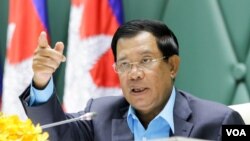Prime Minister Hun Sen on Wednesday claimed that his so-called ‘win-win’ policy that allowed Khmer Rouge militants to integrate into the Cambodian armed forces was the deciding factor that led to peace in the country.
At a meeting with former Khmer Rouge fighters in Pailin province, a stronghold of the group until the mid-1990s, Hun Sen said the policy had had a greater effect on creating a peaceful settlement than the Paris Peace Agreement of 1991 or the UNTAC elections of 1993.
He said UNTAC – the U.N. mission to Cambodia – had “spent heaps” to operate in Cambodia, but had left behind “a country of two factions and two governments that fought each other endlessly.”
Hun Sen disputed the results of the 1993 election, which he lost, and negotiated a co-prime ministerial role alongside Prince Norodom Ranariddh until a bloody 1997 coup saw him take full control.
“If there was no win-win policy,” he told those gathered in Pailin this week, “there would be no peace like now.”
Civil society groups raised concerns this week that the ideals of the Paris accords –which turn 25 years old this month – were not being fully implemented, pointing to alleged partisanship in the judiciary and restrictions on freedom of expression.
Son Chhay, an opposition lawmaker, said that members of his Cambodia National Rescue Party had come under assault in a series of legal cases, despite having legal immunity from prosecution.
“This is an urgent issue which needs to be dealt with soon to make state institutions stronger and reduce individual power,” he said.
Keo Remy, head of the Cambodia Human Rights Committee, a government body, rejected the allegations, saying the government’s human rights record was “not bad.”
“We continue to follow international standards. The most important is peace and continued stability... Look at Arab in middle east, where is human rights? In Syria, in Iraq and Afghanistan,” he said.







